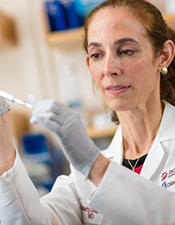CRISPR-Cas9 screen opens new targets for Ewing sarcoma, other childhood cancers
- Published:

While the genetic mutations driving adult cancers can sometimes be targeted with drugs, most pediatric cancers lack good targets. That’s because their driving genetic alterations often create fusion proteins that aren’t easy for drugs to attack.
“This is one reason why it is notoriously hard to make targeted drugs against childhood cancers — their cancer-promoting proteins often lack good pockets for drugs to bind to,” says Kimberly Stegmaier, MD.
However, that’s beginning to change. Stegmaier and her colleagues at Dana-Farber/Boston Children’s Cancer and Blood Disorders Center are successfully employing a powerful combination of new genomic and chemical technologies to seek out promising novel targets.
Their collaboration has produced a new clinical trial for patients with Ewing sarcoma and selected other childhood cancers. These cancers typically have one genetic characteristic not shared with most adult cancers — normal, unmutated copies of the TP53 tumor suppressor gene.
Sometimes called the “guardian of the genome,” TP53 normally can help to pull the plug on cells that have turned cancerous. As in the overwhelming majority of pediatric cancers, it usually remains unmutated in Ewing sarcoma, a pediatric bone cancer whose standard treatment includes tough rounds of chemotherapy. Yet, molecular mechanisms somehow are preventing TP53 from doing its job as guardian.
Read the full story on Answers.

 Translate
Translate